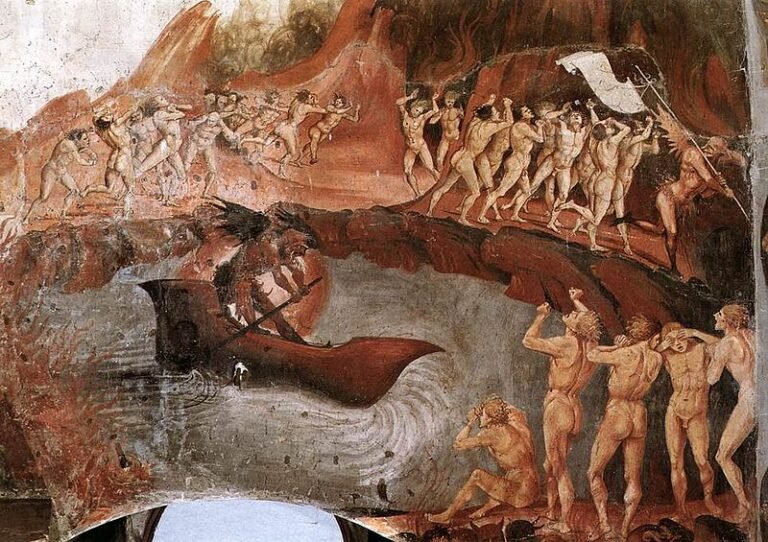HELL DOESN’T MAKE ANY SENSE IF GOD IS TRULY JUST: HERE’S WHY IN 7 POINTS
Is Hitler going to heaven? The strongest arguments for Christian universalism, drawn from ‘That All Shall Be Saved’ by David Bentley Hart.
Around 5m. reading

Think with me:
1. Pure evil doesn’t exist (a view affirmed by logic and mainstream Christian philosophy). There’s merely corruption of what is good. Anything we call ‘evil’ still contains some element of goodness in it.
“Evil has no positive nature; but the loss of good has received the name ‘evil’.” — St. Augustine, Enchiridion
Evil is not able to create anything new, it can only distort and destroy what has been invented or made by the forces of good. – probably not J.R.R. Tolkien
2. Therefore a person cannot choose pure evil. We only choose between good and less good, pure good or corrupted good.
3. Human mind is limited. Imperfect. Finite. Lacking complete expertise, including the expertise of what is better and what is worse (while, of course partial understanding of that is available to us).
4. Therefore our choices are finite and based on finite understanding.
5. A person having a full understanding of what is good, wouldn’t be able to choose a worse option rationally and freely.
6. Hell, as an infinite/eternal/final punishment/consequence of finite, not-fully-rational actions and choices cannot be called ‘appropriate’ or ‘just’.
7. Since we’re not omniscient like God is, our choices will always be flawed and based on limited understanding. Therefore at no point will we fully deserve an infinite damnation, whether in this world or in the afterlife.
Let’s have an example, and since we’re in the internet, let’s not play nuance. Let’s think of Mr Hitler.
The evilest man ever according to modern Western demonology, Adolf Hitler, did not think he had bad intentions. I doubt he ever saw himself as of an evil man choosing evil ways. The evilest ever ideology, nazism, had elements of good in it. Otherwise it couldn’t exist. There was love of one’s country, love of one’s people, welfare and progress of the human race… Of course the love was matched with hatred of other countries and peoples, of course the means to progress and welfare were, you know, questionable, but that’s not the point. The point is not everything there was inherently evil and selfish. There were echoes of goodness.
We could have another psychologising article on young Adolf’s miseries, or explaining the common trauma the German nation suffered before they all went nazi-mad. How bad their circumstances were is not the point either – the point is that their understanding and ability to choose was limited. They thought they were right. They actually did think they were good.
Were they aware of ALL the consequences of their actions? No, not FULLY.
Were the consequences of their action finite? Yes – no matter how great the suffering, not matter how many millions people were affected in how a monstrous way, it was finite in time and space.
Even if you make Adolf Hitler suffer as all the war and holocaust victims suffered, even if you multiply it tenfold, what you get does not amount to the eternal suffering of one person in the eternal Hell of mainstream western Christianity. Because eternal isn’t finite. And Adolf Hitler would end up there on the basis of his highly misinformed choices made by his wicked – yet finite – mind.
Eternal hell doesn’t therefore make sense even for Adolf Hitler, as long as we assume God is just.
If Adolf Hitler could fully, properly understand himself, his choices and their consequences, he wouldn’t have gone the way he went.
Can he repent? How much time should he get for that? How many chances?
Well, infinitely good God has an infinite number of chances and infinite amount of time to give to anyone.
CLAIMS ON INFINITY MADE BY FINITE BEINGS?
If I understood it correctly, so goes the main line of reasoning David Bentley Hart, a Christian Orthodox theologian and a hardline universalist, explains in his book ‘That All Shall Be Saved’.
What does ‘a hardline universalist’ mean? Universalism is a doctrine claiming universal salvation of all people. How to make it hardline? Hart says that it’s his theological deal-breaker, his Christianity’s ‘to be or not to be’: if it weren’t true, he wouldn’t remain Christian.
Maybe that’s a safe statement on his side, since for now we have no way to definitely verify the claims of universalism.
Or maybe that’s a radical statement, for the very same reason.
His line or reasoning has an undeniable appeal. It’s hard to argue with its logic (for the better account of it, check the book!)
Universalism has its own pull.
(First time hearing about universalism? No, it’s not a modern Christian invention. No, it’s not a heresy. Yes, there actually are biblical grounds for it; yes, it has been present in the history of Christian soteriology (doctrine of salvation) pretty much from the beginning. But I want to keep this post short. There will be more about it somewhere else in the blog)
‘That All Shall Be Saved’ is the strongest case for universalism I’ve come across.
It’s great to be hopeful. Universalism does sound nice, and I’ve always found claiming otherwise somehow suspicious.
But here we are, imperfect, irrational, limited human beings, who cannot really know good from better.
Here were are talking concepts like God, eternity, justice, salvation and free will – like we actually knew what we’re talking about.
Here we are putting such concepts into lines of logical reasoning, like they were digits in a schoolbook equation.
From that angle, it’s hard to accept Hart’s ‘hardline’ stand.
I am hopeful myself. But let me suggest some healthy deal of Christian agnosticism when we approach such topics.

